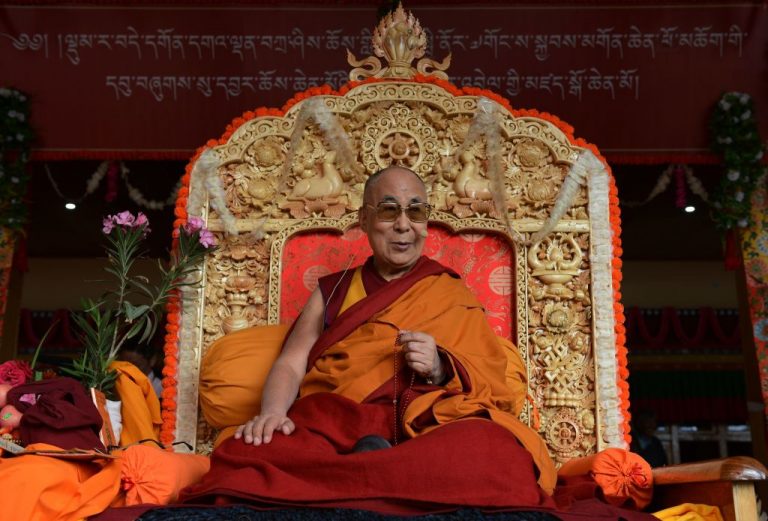The U.S, India, and Taiwan sent greetings to the exiled Tibetan spiritual leader
On July 6, the Dalai Lama celebrated his 86th birthday. Indian Prime Minister Narendra Modi spoke with His Holiness, greeting him and wishing him a long and healthy life. However, the Chinese Communist Party (CCP) was apparently unhappy with how people across India and the world were celebrating the birthday of the spiritual head of Tibetans.
On China’s Tibetan border alongside Dolay in Ladakh, Chinese demonstrators, which included military personnel and civilians, arrived in five vehicles and displayed flags just 200 meters from a community celebrating the birthday of their spiritual leader.
“Chinese PLA & Civilians holding banner just opposite side of river Indus, Dolay near Kuyoul, where Indian villagers celebrating H.H Dalai Lama’s Birth Anniversary. This is too much from the Chinese side. They react to every development at the border. But this is unfortunate,” Konchok Stanzin, a councilor at Chushul village in Ladakh, tweeted together with a video of the Chinese demonstration.
A part of China since the Qing Dynasty, Tibet has traditionally enjoyed self-rule. That changed in the 1950s, when the communist regime occupied and imposed its totalitarian system in the region. Hundreds of thousands of Tibetans — an ethnic group numbering around 6 million — have died at the Party’s hands. Their culture, language, and Buddhist faith are frequent targets of the CCP’s efforts to indoctrinate the locals with its atheist Marxism.
Success
You are now signed up for our newsletter
Success
Check your email to complete sign up
Many Tibetans have fled communist rule, forming a large exile community in countries such as India. Among them is the 14th and current Dalai Lama — the spiritual leader of Tibetan Buddhism — who was born in 1935.
In a write-up by the CCP-backed Global Times, editor-in-chief Hu Xijin attempted to downplay the birthday greetings sent by India and other nations.
“These small tricks cannot have any actual impact. Countries like the US, Japan, Australia, and India have already fallen out with China. They like playing such small tricks to demonstrate their ‘values’. Let them be,” said the article.
Hu went on to claim that Tibet is developing under the Chinese regime and that Dharamsala, the Indian region where Tibetan exiles including the Dalai Lama are residing, is somehow less developed in comparison.
Meanwhile, the CCP is cracking down on those in China who dare support the Dalai Lama. According to a report by Radio Free Asia, Chinese officials in Tibet’s Sichuan region recently arrested two Tibetans, a man and a woman in their 40s.
”They were arrested on suspicion of being part of a group on social media that shared images and documents, and encouraged the reciting of Tibetan prayers on the birthday of His Holiness the Dalai Lama,” Golog Jigme, a former political prisoner now living in Switzerland, said to the media outlet.
Jigme revealed that around 20 to 30 more Tibetans have been arrested for celebrating his birthday. However, their names and places of arrest are unknown “due to strict restrictions on communications in the region.”
In an interview with the South China Morning Post, Jigme Yeshe, Tibetan-origin assistant professor at the University of Calcutta, said that Modi’s phone call with the Dalai Lama might have been a response to China’s persistent “belligerent attitude.” Yeshe feels that the call could be a sign of a new relationship between the Indian government and the country’s Tibetan community.
“This is the first time that an Indian prime minister has [publicly] greeted the Dalai Lama on his birthday and it’s a clear signal to China that India’s Tibet policy can change… It sends a strong message that India backs the Tibetan people and that it might extend stronger support to the Dalai Lama,” Yeshe said.
Taiwan and US response
Taiwanese President Tsai Ing-wen sent her regards to the Tibetan spiritual leader on his birthday. “Thank you for teaching us the importance of coming together to help one another through this pandemic,” Tsai said in a tweet.
An image attached to the tweet contained a quote from the Dalai Lama on the Coronavirus Disease 2019 (COVID-19) pandemic: “This crisis shows us that we are not separate from one another – even when we are living apart. Therefore, we all have a responsibility to exercise compassion and help.”
Taiwan’s foreign ministry said that it welcomed His Holiness should he choose to visit the island once again. “We will, in accordance with the principle of mutual respect and at a time of convenience for both sides, welcome the Dalai Lama to come to Taiwan again to propagate Buddhist teachings,” ministry spokeswoman Joanne Ou said, as reported by Reuters.
The Dalai Lama last visited Taiwan in 2009. In a recent message to supporters, he said that he hoped to visit the island nation soon.
Antony Blinken, U.S. Secretary of State, said that he was “delighted” to extend wishes to the Dalai Lama on his 86th birthday. “His Holiness is an inspiration to many around the world who are drawn to his messages of compassion, equality, and inclusivity,” Blinken said in a statement.
On Dec. 21, 2020, Congress had passed the Tibetan Policy and Support Act, which insisted that the selection process of Tibetan Buddhist leaders, including the next Dalai Lama, were “exclusive spiritual matters” of the Tibetan community. The Chinese regime is attempting to instate a person of its choosing as the next Dalai Lama, which conflicts with the traditions of Tibetan Buddhism.
The CCP recognizes Buddhism as one of China’s five legal religions, but requires that all people of faith put the Communist Party before their deities, and demands strict control over all religious organizations. In practice, believers are forced to study communist ideology or persecuted severely for their faith.
Tenzin Gyatso, the Dalai Lama’s personal name, escaped Tibet in 1959 and has been living in India ever since. The CCP often accuses the Dalai Lama and his supporters of being “separatists,” and has launched a campaign to replace the native Buddhist tradition with a Party-approved version.
Dharamsala, located in the northern state of Himachal Pradesh, is the headquarters of the Tibetan Government-in-Exile, which is composed of refugees from Tibet who escaped persecution under the CCP’s rule. There are about 95,000 Tibetan refugees currently residing in India.







